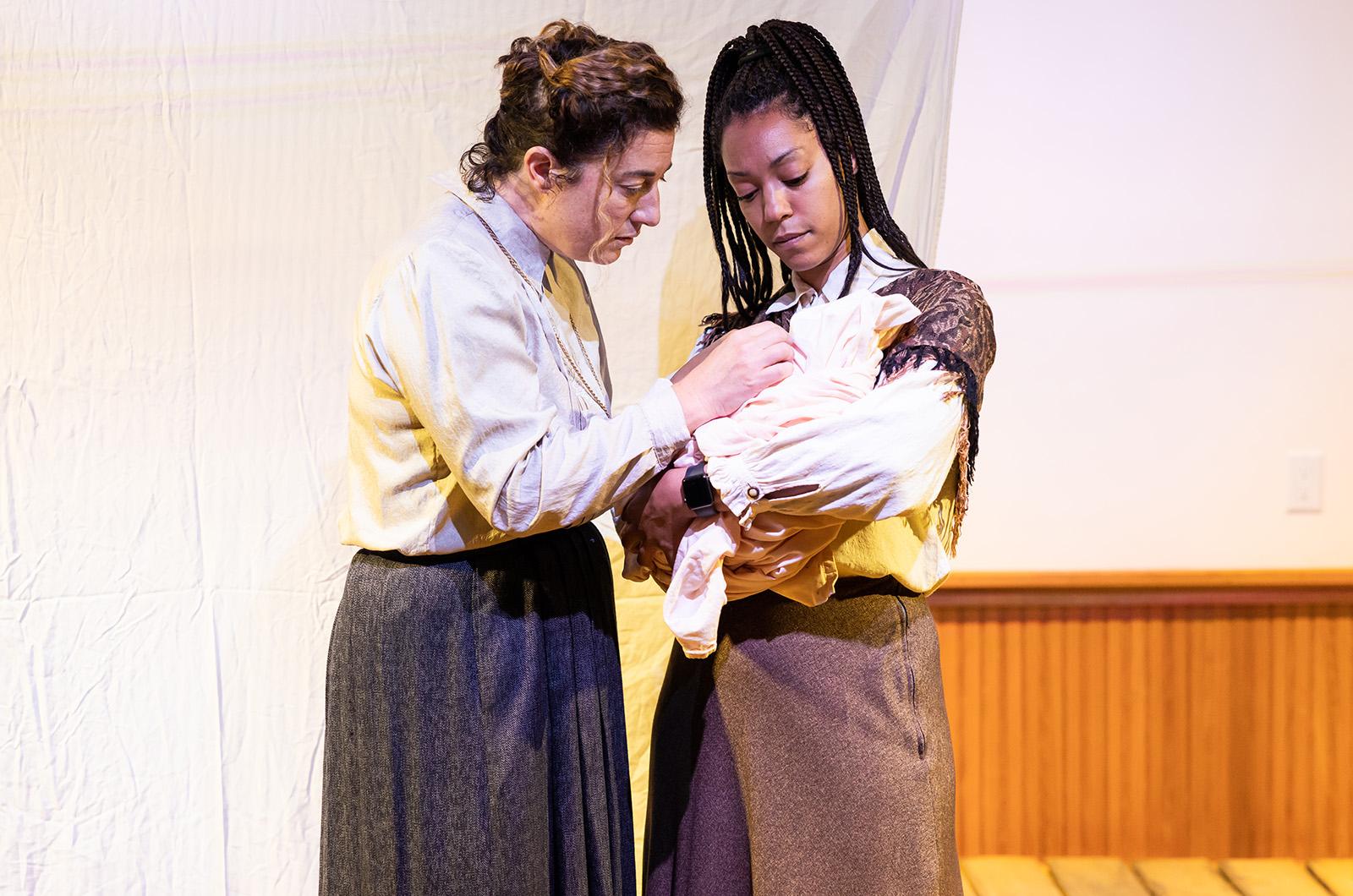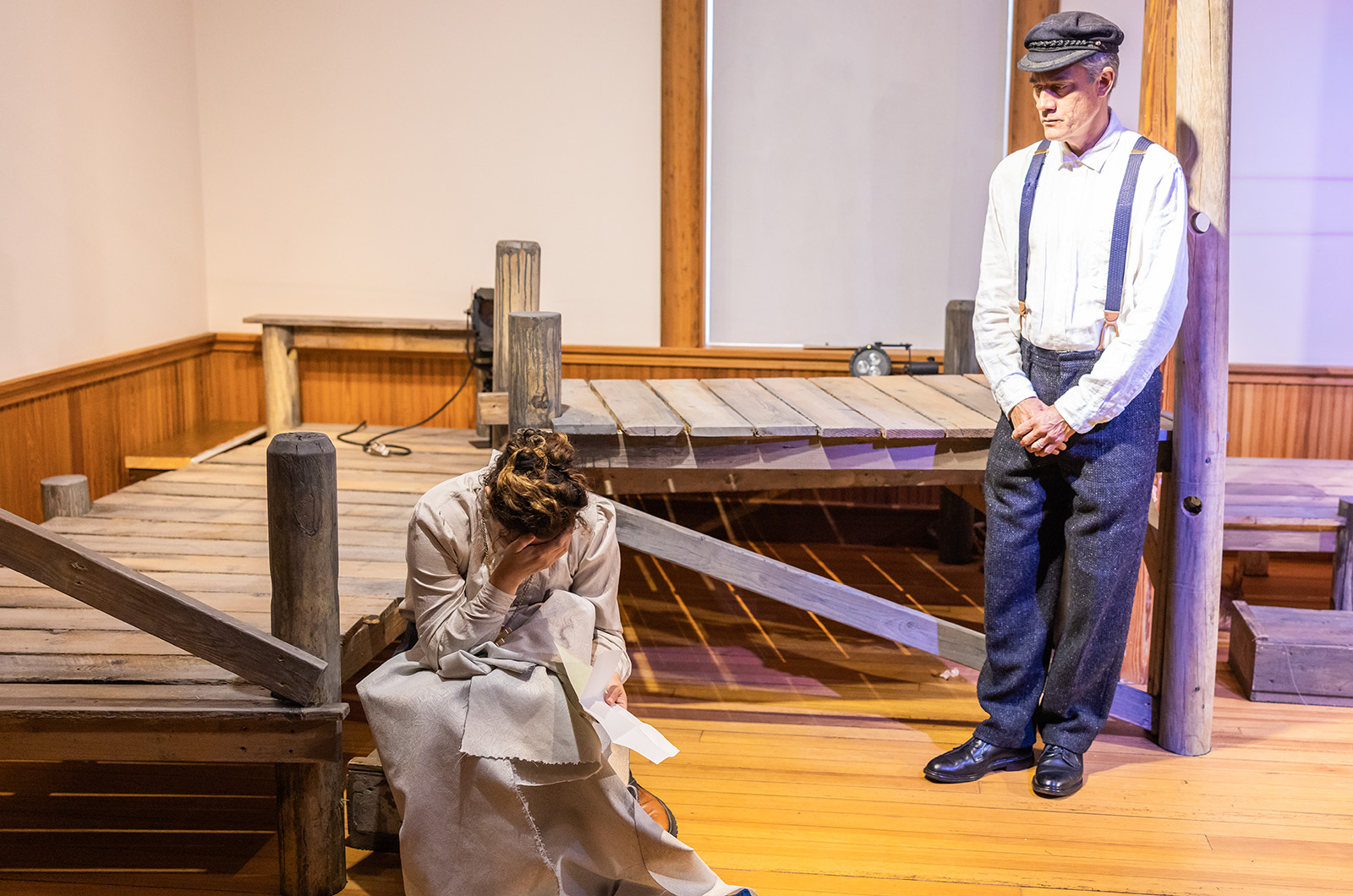The Outcasts of Penikese Island, playing Tuesday to Saturday at the Martha’s Vineyard Playhouse through August 26, tenderly restores to light a shadowed episode of institutional cruelty from more than a century ago.
Scott Barrow, an actor with Broadway credentials who has often appeared at the playhouse and elsewhere on the Vineyard, devised this deeply moving play from poet Eve Rifkah’s book Outcasts: The Penikese Island Leper Hospital, 1905-1921. An aching story of injustice and despair that somehow never abandons all hope, The Outcasts of Penikese Island is an outstanding illustration of the playhouse’s mission to foster and develop new theatre.
Mr. Barrow worked collaboratively with his professional cast of seven actors to create more than 20 individual characters from Ms. Rifkah’s poems about the people with Hansen’s disease who were exiled to Penikese for life. Many were recent immigrants, such as Cape Verdean mother Isabelle Barros, played by Brooke Hardman, and Iwa Umezakia (Paul Padua) from Japan, two of the 14 patients who died and were buried on Penikese.
Others were American-born citizens, as young as 16-year-old Archie Thomas (played by Gabriel Graetz). All were hauled from their homes by authorities after being tested for the infectious bacteria that causes the disease long called leprosy, for which there was no treatment other than isolation.
Taken to Penikese by steamer, the stunned exiles in Mr. Barrow’s play must make a new life at the leprosarium, where at first their only ally is the snarky but golden-hearted attendant Sarah, also played by Ms. Hardman.
Elevated by Ms. Rifkah’s poetic language and the actors’ compelling performances, Mr. Barrow’s play restores human dignity to all 14 of the patients who ended their days on Penikese, and shines new light on those who cared for them. A change of head doctors brings a kindlier regime to the patients, but the passage of time carves an ever-deeper channel between the Penikese shore and the world of their families.
Giving voice to the outcasts’ letters home, a series of scenes at mail call reveal the isolation engulfing Morris Goldblatt, played by Mr. Graetz, as he pleads with his wife to write and tell him news of his children.
“Only a letter, is all I ask, to see in words what I can’t imagine.... Esther, this disease is not my doing. In sickness and in health, we married. Why don’t you write?” he begs.
In one of the play’s most affecting passages, heightened by the emotion in Ms. Hardman’s nearly-wordless performance, Isabelle Barros gives birth to her third child in the leprosarium and the baby is taken from her to become a ward of the state, as were her other two children when she was exiled.
Along with Ms. Hardman, Mr. Padua, Mr. Young and Mr. Graetz, the show stars Islander Shelagh Hackett and visiting actors PJ Johnnie and Nemuna Ceesay, whose various roles include the reformists Dr. Frank, Marion Parker, as well as hospital inmates.
Ms. Ceesay also plays a present-day woman visiting the Penikese Island cemetery, guidebook in hand, in a framing device that adds just the right amount of context to the main story.
Every character in the play is clearly drawn and distinct from others played by the same actors, with slightly different costume elements quickly doffed and donned between entrances. Not only does this show offer a master class in writing and acting — it’s a small technical marvel, given that the playhouse main stage is still out of commission until its new air-handling system is installed.
Set designer Mac Young — who also plays a doctor and two patients — has turned the playhouse lobby into an immersive space using lighting, music, birdsongs and sea sounds. Some of the action emerges from behind the audience, while the stage work makes strategic use of sheets and laundry lines on pulleys to both mark new scenes and provide lightning-quick costume changes as the actors switch characters.
Two hours in length, including intermission, the play keeps viewers’ attention throughout, with flashes of humor and pathos and more than one moment of suspense from patients and doctors alike.
Island theatre-goers should make note on their calendars this week: this show is one of a kind.
The Outcasts of Penikese Island plays at 7 p.m. Tuesday through Saturday though August 26 at the Martha’s Vineyard Playhouse in Vineyard Haven. Tickets: mvplayhouse.org.








Comments (1)
Comments
Comment policy »